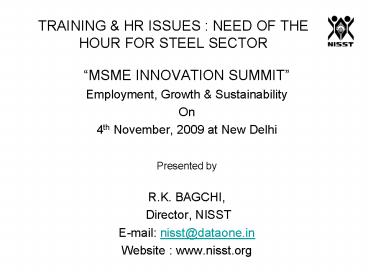TRAINING - PowerPoint PPT Presentation
1 / 12
Title:
TRAINING
Description:
A PREMIER INSTITUTE CATERING TO THE NEEDS OF SMEs OF STEEL SECTOR. 3. AIMS AND OBJECTIVES. TO EXTEND CONSULTANCY SERVICES TO INDUSTRIES IN TERMS OF SOLVING ... – PowerPoint PPT presentation
Number of Views:23
Avg rating:3.0/5.0
Title: TRAINING
1
TRAINING HR ISSUES NEED OF THE HOUR FOR
STEEL SECTOR
- MSME INNOVATION SUMMIT
- Employment, Growth Sustainability
- On
- 4th November, 2009 at New Delhi
- Presented by
- R.K. BAGCHI,
- Director, NISST
- E-mail nisst_at_dataone.in
- Website www.nisst.org
2
THE ORGANISATION
- NATIONAL INSTITUTE OF SECONDARY STEEL
TECHNOLOGY(Established by Ministry of Steel, - Government of India) An ISO 9001-2000
ORGANISATION - A PREMIER INSTITUTE CATERING TO THE NEEDS OF SMEs
OF STEEL SECTOR
3
AIMS AND OBJECTIVES
- TO EXTEND CONSULTANCY SERVICES TO INDUSTRIES IN
TERMS OF SOLVING TECHNOLOGICAL PROBLEMS,
IMPROVING ENERGY EFFICIENCY AND REDUCING
POLLUTION LEVELS. - TO BRING AWARENESS ABOUT THE STATE OF ART
TECHNOLOGY BY HOLDING SEMINARS, WORKSHOPS,
SYMPOSIA, ETC. - TO PROVIDE TRAINED TECHNICAL MANPOWER TO THE
SECONDARY STEEL SECTOR AND TO UPDATE THEIR
KNOWLEDGE BASE. - TO PROVIDE VARIOUS INDUSTRIAL SERVICES AND
TESTING FACILITIES. - TO CONDUCT RESEARCH, DEVELOPMENT DESIGN WORK IN
FRONTIER AREAS FOR PROVIDING UPDATED TECHNOLOGY
TO THIS SECTOR. - TO ORGANISE FOR DOCUMENTATION AND INFORMATION
RETRIEVAL SERVICES TO THE STEEL INDUSTRY. - TO PROVIDE THE PLATFORM FOR INTERACTION BETWEEN
INDUSTRY AND EDUCATIONAL AS WELL AS RESEARCH
INSTITUTIONS.
4
MAJOR FOCUS AREAS
- HUMAN RESOURCE DEVELOPMENT
- INDUSTRIAL CONSULTANCY SERVICES
- INDUSTRIAL RESEARCH DEVELOPMENT
- ENERGY AUDITS
- TESTING SERVICES
- POLLUTION ASSESSMENT
- CAD/CAM/CAE
- SAFETY INSPECTION OF FACTORIES
- CAPACITY ASSESSMENT
- FEASIBILITY REPORT PREPARATION
- SKILL DEVELOPMENT PROGRAMMES FOR SHOPFLOOR
PERSONNEL
5
SERVICE TO THE NATION
- Generation of employment through various
courses/training programmes for skill
development - To reduce energy consumption levels in steel
industry through various activities like In-house
General Awareness Programmes, Energy Audits
Consultancy services - Promoting the international cause of GHG
reduction by assisting the industry through
various projects undertaken by UNDP/GEF Project,
USAID-IRG, ECO-III etc. - Introduction of clean working practices, emission
reduction, designing better pollution control
devices and environment monitoring - Contributing towards overall technological
human resources growth in the SMEs of steel
sector.
6
NEED FOR ENERGY CONSERVATION
- Production processing of steel is one of the
most energy intensive sector - Any overspending of energy leads to metallurgical
environmental deterioration - Every unit of energy spent puts pressure on
exchequer - Energy saved is energy earned
- Cost of energy constitutes more than 50 of the
total manufacturing cost of steel - Any reduction in this component will enhance the
margin of profitability - The period of recession must be taken up
positively for preparedness for the next boom
phase - Culture attitude of energy conservation should
be inculcated at all the levels of work force
7
TYPES OF ENERGY
- Commonly understood industrial energy has two
components - Electrical Energy
- Thermal Energy
- Third important component in all sectors is
- HUMAN ENERGY
- It is the man behind the machine who actually
delivers - This Human Energy must be seriously considered
for development - It has two forms
- Potential Energy Knowledge
- Kinetic Energy - Dynamism Labour
- Both these should be judiciously developed Skill
development programmes should focus on the
balance.
8
ESTIMATED SHORTFALL OF SKILLED HR
- TARGET Steel production to reach 200 MT by
2020. - Primary steel producers have got enough resources
for HRD which is lacking in SMEs. - SMEs contribute about 35 of steel production
- Estimated CAGR could be 3 MT for this sector
- To maintain the CAGR, estimated additional annual
requirement of manpower per MT (non-engineers) - - Skilled (Sr.Diploma/Diploma) 100
- Semi-skilled (ITI or equiv.) 400
- Semi-skilled workforce(shopfloor) 4000
- Considering Green Field and Brown Field projects
and retirement/death, 50 more would be needed. - Contd..
9
- Hence revised estimated additional annual
requirement of manpower per MT (non-engineers)
now stands - - Skilled (Sr.Diploma/Diploma) 150
- Semi-skilled (ITI or equiv.) 600
- Semi-skilled workforce(shopfloor) 6000
- Thus the figures of additional manpower needed
for CAGR of 3 MT comes to - - Skilled (Sr.Diploma/Diploma) 450
- Semi-skilled (ITI or equiv.) 1800
- Semi-skilled workforce(shopfloor) 18000
- The scope of employment generation in SMEs of
steel sector at all levels is enormous. - As regard to Training, Development Education,
the figures would be much more considering both
new induction existing employees.
10
- Maintenance consideration is integrated to any
production process - Additional manpower at all levels in Maintenance
(both Electrical Mechanical) would also be
needed - The cumulative figure of manpower need in the
SMEs of steel sector would increase - A nation wide concentrated and judicious effort
is needed to overcome this shortfall of HR. - Short term modular courses could be designed for
working personnel in various disciplines - Fresh course curriculum may be designed for new
entrants with an understanding with the industry
for their employment - Various recognitions may also be obtained for the
courses
11
COURSES RUN BY NISST
- For working personnel -
- Modular courses of different duration (need
based) in the areas of Ferrous Metallurgy,
Steelmaking, Quality Control, Casting, Reheating
Furnace, Rolling Technology, various testing
methods, Heat Treatment, etc. - In-house training programmes (shopfloor
demonstrations) of shorter durations (need
based) These are tailor-made to suit the
requirements of individual units. - For new entrants/fresh candidates -
- Job Oriented Certificate Course (JOCC) in
Steelmaking Technology and Rolling Technology - Short Term modular Certificate courses in
Steelmaking, Rolling Technology, Quality Control,
Reheating Furnace operation, various testing
methods and Heat Treatment.
12
- Let us resolve to join hands and work together
with sincerity and live upto potential for the
generation of employment opportunities which is a
grave national concern HR in all spheres and
steel sector in particular. - Each ones contribution would be enormous, if
snergized. - THANK YOU































